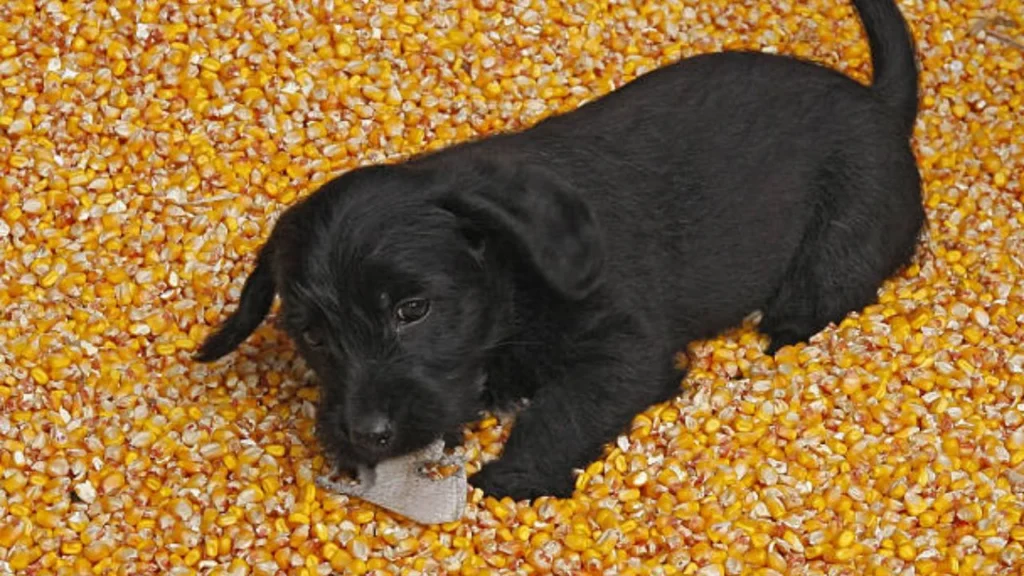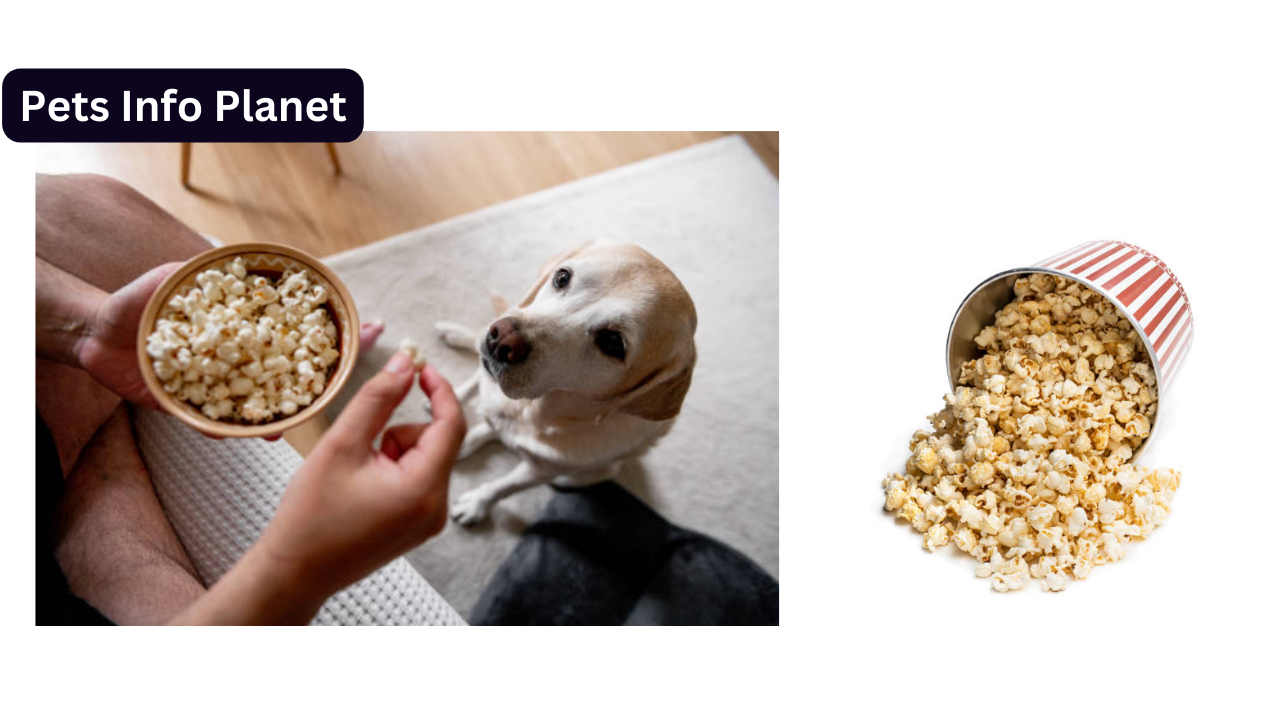Popcorn is a tasty snack that people often enjoy, especially during movie nights. It has a tempting smell and a satisfying crunch. But what about our furry friends? Can dogs eat popcorn, and if they can, how should we give it to them? Let’s find out how to make popcorn a safe and enjoyable treat for our dogs while being responsible pet owners.
Is It Safe For A Dog To Eat Popcorn?

The safety of dogs consuming popcorn unveils a nuanced perspective. In essence, plain, air-popped popcorn can be a safe treat for your canine companion when offered in moderation. However, caution is paramount when considering variations like buttered or salted popcorn, as these additives can pose health risks to dogs. Responsible pet ownership involves opting for plain popcorn sans embellishments to ensure a delightful and safe snacking experience for your furry friend.
How Should I Feed Popcorn To My Dog?
A thoughtful approach is crucial when contemplating offering popcorn to your canine companion. Opt for plain, air-popped popcorn without additional toppings like butter or salt to safeguard your dog’s well-being. Breaking the popcorn into smaller, bite-sized pieces mitigates choking hazards and facilitates easier digestion. Moderation is essential, as overindulgence can upset your dog’s stomach. Avoid flavored or seasoned varieties, as they may contain ingredients harmful to dogs. Constantly monitor your furry friends while they indulge, and consult your veterinarian promptly if you notice any adverse reactions.
How Much Popcorn Can Dogs Eat?
Determining the appropriate amount of popcorn for your canine companion involves balancing treat enjoyment and responsible pet care. While plain, air-popped popcorn can be a safe, low-calorie dog snack, moderation is key. Limit the popcorn intake to a small serving, considering your dog’s size, weight, and dietary needs. A few pieces of plain popcorn can be a delightful treat without overwhelming their digestive system. Avoid excessive portions to prevent potential digestive issues and unnecessary caloric intake. Consult your veterinarian to determine the most suitable quantity based on your pet’s unique characteristics.
What Kind Of Popcorn Can Dogs Eat?
Choosing the right kind of popcorn is paramount for your dog’s well-being. Dogs can safely enjoy plain, air-popped popcorn without any added toppings like butter, salt, or seasonings. While these additives may appeal to our taste buds, they can pose health risks for dogs, potentially causing digestive or sodium-related problems. Opting for a simple, unsalted variety ensures a canine-friendly treat that minimizes potential complications. Breaking the popcorn into bite-sized pieces further prevents choking hazards and promotes ease of digestion.
Can Dogs Eat Popcorn Kernels?

While dogs munching on popcorn kernels may seem harmless, caution is advised. Dogs can technically eat popcorn kernels, but there are inherent risks involved. The complex and un-popped seeds pose a significant choking hazard and may cause digestive obstructions. To mitigate these risks, offering your canine companion only fully popped, air-popped popcorn without kernels is advisable. This ensures a safer and more enjoyable snacking experience, prioritizing their safety and well-being.
Can Dogs Eat Popcorn With Butter
Plain, air-popped popcorn can be a safe and low-calorie dog treat, but caution is essential regarding popcorn with butter. While a small amount of butter is generally not harmful, excessive consumption can lead to digestive issues or even pancreatitis due to its high-fat content. Some dogs may be lactose intolerant, making butter a potential trigger for gastrointestinal upset. Consult your veterinarian before introducing popcorn or new food into your dog’s diet.
Can Dogs Eat Popcorn With Salt And Cheese

Caution is advised when dogs eat popcorn with salt and cheese. While plain, air-popped popcorn is a safe, low-calorie dog treat, adding salt and cheese introduces potential risks. Salt, in large quantities, can lead to sodium ion poisoning, resulting in symptoms like vomiting, diarrhea, excessive thirst, and seizures. Excessive fat consumption from cheese can lead to digestive issues, pancreatitis, and weight gain. Lactose intolerance is also common among dogs, making cheese a potential trigger for gastrointestinal upset. It’s best to avoid offering popcorn with salt and cheese to dogs and consult your veterinarian for suitable alternatives.
Can Dogs Eat Popcorn Seeds
Exercise caution regarding dogs eating popcorn seeds. While popcorn can be a safe and enjoyable treat for dogs when served plain and air-popped, popcorn seeds can pose a choking hazard and may get lodged in a dog’s throat or digestive tract. To ensure your canine companion’s well-being, it’s best to avoid feeding them popcorn seeds altogether. Stick to offering your dog plain popcorn without any sources as a treat in moderation, and always keep a close eye on them while they enjoy their snack. Consult your veterinarian for personalized advice if you have any concerns or questions.
What Happens If A Dog Eats A Bag Of Popcorn?
A dog eating a bag of popcorn can lead to various issues requiring attention. The main concern is the risk of gastrointestinal problems and potential blockages. The bag itself can pose a choking hazard and cause obstructions in the digestive tract. Ingesting large amounts of popcorn, especially with added butter, salt, or flavorings, can also lead to digestive upset, including vomiting and diarrhea.
If the bag was made of plastic or contained toxic materials, it could pose a severe health threat. It’s essential to monitor your dog closely and contact a veterinarian if you suspect they have consumed a bag of popcorn. The veterinarian will provide guidance based on the specific circumstances, potentially recommending medical intervention or monitoring the dog’s symptoms closely to ensure their well-being.
Popcorn Substitutes For Dogs
When it comes to finding popcorn substitutes for dogs, several safe and enjoyable options can provide similar snacking experiences for your furry friend:
Carrot Sticks: Crunchy and low in calories, carrot sticks make a healthy substitute for popcorn. They are rich in vitamins and minerals, promoting good oral health and a satisfying chewing experience.
Green Beans: Steamed or lightly cooked green beans are another great option. They offer a satisfying crunch and are packed with fiber, vitamins, and antioxidants. Avoid seasoned or canned green beans, which may contain additives unsuitable for dogs.
Air-Popped Plain Rice Cakes: These can mimic the texture of popcorn while being low in fat and calories. Opt for air-popped varieties without any added flavors or toppings.
Freeze-Dried Fruits or Vegetables: Freeze-dried fruits or vegetables, such as apple slices or sweet potato chips, can provide a crunchy and nutritious snack for dogs. Ensure they are free from any added sugars or seasonings. Remember, moderation is key when offering any treats to your dog, including these popcorn substitutes. It’s always a good idea to consult your veterinarian to ensure that the chosen alternatives align with your dog’s dietary needs and overall health.
Read More:
Can Dogs Eat Mango? Read Before You Feed
Can Dogs Eat Tomatoes? Read Before You Feeding
Can Dogs Eat Oranges – Comprehensive Guide
Conclusion
In conclusion, when dogs eat popcorn, prioritizing their safety and well-being is essential. While plain, air-popped popcorn in moderation can be a canine-friendly treat, caution should be exercised with variations like buttered, salted, or flavored popcorn. Avoid potential hazards like popcorn kernels and be mindful of the quantity based on your dog’s size and dietary needs. Opting for substitutes such as carrot sticks, green beans, or plain rice cakes can provide a safe and enjoyable snacking experience. Monitor your dog’s reactions and consult your veterinarian for personalized advice, ensuring a balanced and delightful treat time.

